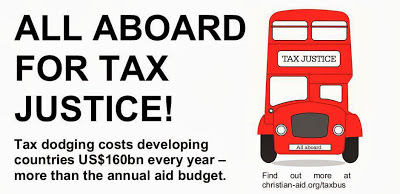Over the weekend, I came across a tweet that I must say was quite intriguing. The tweet talked about Deloitte promoting Mauritius as a tax haven to avoid big payouts to poor African countries. This should be none of my business I guess, but then it actually is.
In July 2013, a campaign in Africa and Europe was launched by Action Aid International. This campaign was as a result of facts that showed that developing countries don’t have sufficient revenues to invest in decent public services and other development interventions. And this is largely due to the loss of huge amounts of money through tax incentives, tax avoidance and tax evasion. The same campaign was launched on a national level for Uganda on September 4th 2013. I was in attendance.
Uganda has made leaps and bounds in a bid to improve revenue collection through taxation. We have over the years seen government of Uganda make considerable improvements in tax administration by re-establishing a large-taxpayers unit, strengthening of tax and customs administration operations, and introducing e- Tax system, efforts that are improving and increasing revenue generation.
However, tax policy reforms have not moved at the same pace limiting the gains that would have accrued due to improvements in tax administration. As a result, Uganda’s tax-to-GDP-ratio has remained one of the lowest in Sub-Saharan Africa, standing at 13 percent compared to 20 percent average for Sub-Saharan Africa.
According to Action Aid Uganda: ‘ estimating revenue loss from tax incentives in Uganda is difficult, since there are different estimates available in the public domain. However, the African development Bank in 2009/10 made estimates of 2 percent of GDP. This amounted to approximately 690 billion shillings (US$272 million) in the 2009/10 fiscal year, more than the 437.17 billion shillings that the government contributed to the health sector that year. Indeed, the productivity level of Uganda Corporate Income Tax has remained at approximately 0.03 far much lower than the average of 0.07 for East Africa.’
Henry Malumo is the lead at Action Aid’s Pan Africa Advocacy engagement on Tax Power. I asked him why it is important this conversation on Tax Power and Tax justice is held. He said that it is important because Africa is currently losing billions of dollars every year because of Tax injustice, nearly all citizens in Africa pay tax in one way or the other while big multinational companies are given tax breaks or tax holidays for over ten years or five years and in some cases a longer period.
Why is this a problem I ask: “These companies drive heavy equipment on the roads which are maintained at the cost of tax payer’s money – in reality, it is the citizens and in many cases people living in poverty who are paying tax on behalf of big international companies. These companies have access to water, electricity and other essential services such as health and education and yet they do not contribute anything to the economy.” Mr Malumo says.
And this is very true. If a company comes into a country especially one like Uganda, they are given incentive to invest. And usually the incentive will be something like a tax holiday. And who is left to pay taxes: it is you and me. If the richer were taxed more according to what they earn and the poor taxed according to what they earn, wouldn’t that be a better way to collect revenue from people that actually do use the resources? That makes a lot more sense. But that is not what is happening. Instead we have teachers who are barely making enough to live on, paying a tonne of taxes and huge investors and their companies being given tax holidays.
According to Mr Malumo, African citizens pay tax but some government officials have colluded with big international companies not to pay tax but pay the people that they employ. Corruption is a major setback and has cost most developing countries huge amounts of money. Africa must and needs to change tax policies that allow big companies to dodge the tax man. These are obviously invisible policies, but they work a lot more than the visible ones that are written in black and white. What is even more sad is that these invisible policies that are implemented are still done so by ‘our statesmen’.
I now understand why there is outrage at the findings by ActionAid that say that Mauritius is promoted as a tax haven. I am made to wonder what Deloitte as a company stands for and what they believe in, in their endeavor to make this world a better place.
But more importantly, what are you doing to stop this impunity from happening?
